Nita Lowey ’59 on women’s leadership, ideals and strength in a public service career
For 30 years, Nita Melnikoff Lowey ’59 has served the people of New York, rising to become the one of the most powerful women in U.S. House of Representatives
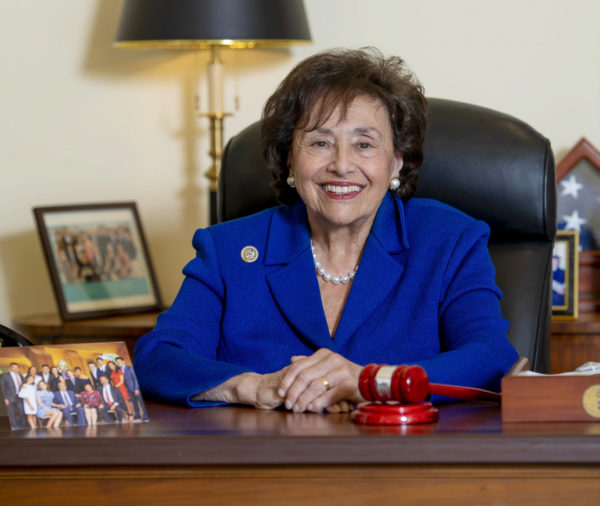
It’s not the case for most people that a big burst of fame arrives at the age of 81.
But U.S. Representative Nita Melnikoff Lowey ’59 hasn’t done things the way most people do for a very long time. She first ran for Congress — and won — in 1988, which was before both the first Year of the Woman for elected officials (1992) or the second Year of the Women (2018). She was 50 at the time. She had never before considered running for office.
Now in her 16th term in the House, Lowey, a Democrat, has become chair of the House Committee on Appropriations — and the first woman to become a ranking member on that committee. While she didn’t envision this crowning achievement when she was first elected more than 30 years ago, Lowey describes herself as someone who always seeks to make things better.
Mount Holyoke connections
“When I was first elected, my political science professor Victoria Schuck came to the Capitol with a paper I’d written at Mount Holyoke in hand,” says Lowey of one of Mount Holyoke’s most beloved and inspiring political science professors. Schuck was responsible for establishing the first-of-its-kind Washington, D.C., internship program in the 1950s and ’60s during which many Mount Holyoke alumnae got their start in public service.
Last fall Lowey spoke to current students participating in Mount Holyoke’s Semester in D.C. program, which launched in the fall semester of 2018. The program combines classes, an internship and the chance to live in D.C. Run in partnership with a larger program through the California Universities Consortium, the program includes a Research Design course exclusive to the Mount Holyoke cohort.
Beth Wagoner ’19 is one of five students to participate in the program, and she was very impressed with Lowey.
“It was September, so she knew if the House flipped, she’d have a lot more power on Appropriations, but the election hadn’t happened yet,” Wagoner says. “I was blown away by her. She was charismatic and well spoken, curious about our impressions and interests. She loves Mount Holyoke and talked about how important her time there is to her. She has a caring quality to her, not so much grandmotherly as ageless. She made a really strong impression on me.”
Wagoner tied Lowey’s agelessness to her ferocity. “She had to take a call in the middle of our time with her,” Wagoner says. “Instead of chasing us out of the room, she just took the call. She transitioned to being tough and serious, authoritative. It was kind of incredible to see her in action. She is fierce, sticks to her guns, clearly a powerhouse. I love her legislative record. She stands strong in her ideals.”
Nita Lowey’s early influences
 Lowey has always stood strong in her ideals. Growing up, she had a role model in her mother. Her parents were born-and-bred New Yorkers, who cared about their region. Her mother cared most deeply about what was closest to her: family and neighborhood. “My mother was upset about an asphalt plant proposed for next door to our family’s apartment building,” says Lowey, who was in elementary school at the time. “She cared about parks, kids and playgrounds. She wasn’t going to let this happen.”
Lowey has always stood strong in her ideals. Growing up, she had a role model in her mother. Her parents were born-and-bred New Yorkers, who cared about their region. Her mother cared most deeply about what was closest to her: family and neighborhood. “My mother was upset about an asphalt plant proposed for next door to our family’s apartment building,” says Lowey, who was in elementary school at the time. “She cared about parks, kids and playgrounds. She wasn’t going to let this happen.”
Lowey’s mother, Beatrice Melnikoff, who stayed home to serve as primary caregiver for the children — Lowey and her younger brother, Richard — organized the neighbors. “No asphalt plant was built,” says Lowey. “She made a powerful impression upon me: If you see something that isn’t right, you have to jump in.”
Born and raised in the Bronx, Lowey graduated from the Bronx High School of Science before she attended Mount Holyoke. In college, Lowey studied political science and, like so many other Mount Holyoke students, she spoke up when confronting a problem.
In the 1950s, Chapel attendance was mandatory for Mount Holyoke students. Lowey, one of “a small Jewish population,” got together with a group of friends and organized Friday-night services, fulfilling the requirement and organizing for change at the same time.
“Some people see a problem and say, ‘I’ve got to do something about this.'” Lowey says, “That’s me.”
Nita Lowey’s public service beginnings
After graduation, Lowey considered law school but changed her mind. She took a job at an advertising agency, which she describes as “challenging and fun.” She got married. When her children were in school, she became president of the parent-teacher association at their school, P.S. 178 in Queens.
By then, Lowey had established a pattern of leadership wherever she went: president of her sixth grade class, president of her class at Bronx Science and Parent Teacher Association president.
“At my kids’ school, there was the smart class and the dumb class, and I thought that was terrible. No one should leave elementary school with a label of being dumb. We worked to change that and bring all the kids together in class,” Lowey says. “And then we got a new principal.”
“I have always felt a responsibility and obligation to do things that need to be done,” she says. In the early 1980s Lowey volunteered for her neighbor Mario Cuomo’s campaign for governor of New York and then served in his administration as an assistant secretary of state for more than a decade.
“I’d go out in the community to represent the governor’s office,” she says, “be his representative, and see how we could help.” She became very interested in people’s lives, in helping them. To echo her mother’s sensibility, Lowey found herself a “person who gets things done,” and this suited her well.
Then, in the 1988 election cycle for the 20th New York district of the United States Congress, some people approached Lowey and said they didn’t think the other Democrats running in the primary could beat the Republican incumbent, Joe DioGuardi. She had not considered a run, nor had she considered leaving her job with the governor’s office.
“Let me think about it for a week,” Lowey says she told them. Then, when she decided to run, Lowey created a kitchen cabinet — for real. “My friends sat around my kitchen table. I made the soup. We made the calls.” She won, and she has continued to win for the past 30 years.
Nita Lowey becomes an elected official
 After she defeated her conservative Republican opponent by a small margin, Lowey held on to the seat, including through a redistricting change, to serve the 18th New York district. She won by greater margins each time she ran for office. In 2001 and 2002, after serving seven terms, she was the first woman and the first New Yorker to chair the Democratic Congressional Campaign Committee. In 2013, her district changed again; she now represents the 17th New York district.
After she defeated her conservative Republican opponent by a small margin, Lowey held on to the seat, including through a redistricting change, to serve the 18th New York district. She won by greater margins each time she ran for office. In 2001 and 2002, after serving seven terms, she was the first woman and the first New Yorker to chair the Democratic Congressional Campaign Committee. In 2013, her district changed again; she now represents the 17th New York district.
Now in her fourth decade since she first took a seat on the House floor, Lowey continues to make good on her intention to get things done. She did entertain a U.S. Senate run twice — in 2000, when Hillary Clinton decided to run for the seat, and again in 2009, when Clinton became U.S. Secretary of State and Kirsten Gillibrand was named senator. But by staying in the House, Lowey has accrued a great deal of power, arguably at least as much as if she had moved to the Senate.
As the first to chime in about how America should spend $1.3 trillion, Lowey and the ranking Republican on the committee, Kay Granger of Texas, are the first female duo to have led a House Committee since 1977. (And that was the Select Committee on the House Beauty Shop.)
A wide net: public health, the environment, international relations and more
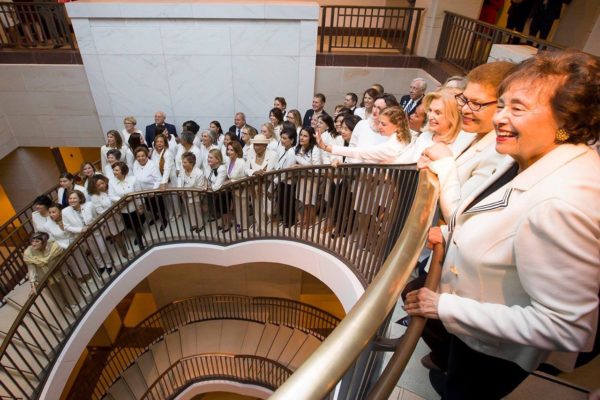
Lowey and other House Democrats wore white to honor suffragists at the February State of the Union Address.
During her time in the House, Lowey has taken on increasing responsibility in an environment that is more fast-paced than ever before. But Appropriations suits her, she says, because the net it casts is so wide. There are 12 subcommittees, and Lowey attends them all. She is also chair of the Subcommittee on State and Foreign Operations.
She is proud of the impact of her work in health care and the environment, including food allergies. Lowey says, “I was approached by parents whose children have food allergies and people with food allergies, and they explained how difficult it was to shop at the supermarket, because no ingredients were labeled. We changed that.”
She soon came to tackle another health concern, the alcohol limit for drivers.
“We passed the 0.8 limit,” she says, citing the support she and her team had from activists to do so. “It was so important. Now, we’re trying to take on e-cigarettes. Over 60 percent of kids in high school have used e-cigarettes. The cigarette companies are creating more addicts than ever before.”
From January 1989 to April 2019, Lowey attended 18,657 of 19,168 roll call votes.
The breadth of issues Lowey addresses each day guarantees, she says, that the job remains fascinating and challenging. On one recent day in early March, Lowey says, she “attended a hearing about construction for the Veterans Administration and the particular health care challenges facing women in the military.
“Then, I was in a foreign operations committee meeting. I have hopes for peace in the Middle East. I plan to continue to press hard for a two-state solution.”
Lowey also spends time advocating for education, “with a special and longtime interest in Head Start,” she says, “because it’s so important that everyone get a chance right away.”
Balancing work and family as a woman
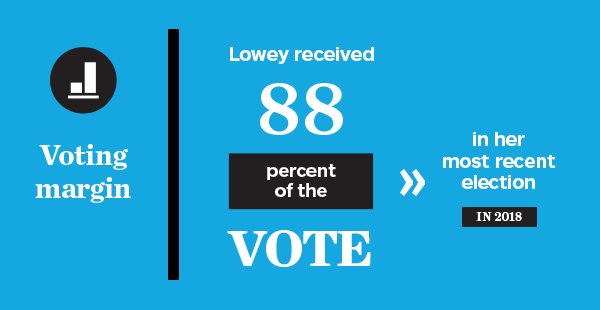 Lowey, grandmother to eight, has been married for more than 50 years. She and her husband, Stephen, have three children. When we spoke midafternoon, she said she’d been on the phone with her daughter, Jackie, “five times already today.”
Lowey, grandmother to eight, has been married for more than 50 years. She and her husband, Stephen, have three children. When we spoke midafternoon, she said she’d been on the phone with her daughter, Jackie, “five times already today.”
Jackie Lowey was a deputy director of the U.S. National Park Service when Lowey was first elected. “She loved her job and she was very much loved in Washington,” says Lowey. “When I first got here, I was Jackie Lowey’s mother.” She laughs.
It was Jackie who helped her mother hire her first staffer in Washington. Lowey’s current chief of staff, Elizabeth Stanley, has been with her for 17 years.
“I am very fortunate to have an extraordinary, responsive, thoughtful and capable staff,” Lowey says. “If I have an idea, the next day I’ll find a memo about the idea, and from there we can decide if it’s worth pursuing.”
Strong Mount Holyoke ties
When she first came to Capitol Hill, Lowey recounts that she sought advice from everyone. Now it is Lowey who speaks to young people who are interested in a career in public office.
“Representative Lowey made it clear that while it looks like, and is, a very contentious, partisan time and the tensions are there, people do reach across the aisle to get things done,” says Wagoner, the Semester in D.C. student.
This sense that working in Congress is a collaborative exercise left an impression on Wagoner, whose experience as an intern in the Department of Labor struck her as quite collaborative, as well. Wagoner interned in the Civil Rights Center of the Department of Labor. MHC alumna Naomi Barry-Perez ’96 was her boss for the semester. “My boss was not a political appointee,” Wagoner said. “She was so skilled at collaboration. I learned a lot watching how people pull together constantly.” Wagoner wrote policy briefs, sat in on calls and meetings and took notes, answered phones and did a substantive report about workplaces and sexual harassment complaints when there aren’t material witnesses.
Codirector of the D.C. program, Associate Professor of Politics Calvin Chen, sets up distinctive opportunities for the cohort to meet interesting people, like Representative Lowey, and learn some life lessons from them. Many, but not all, of the people the group visited were MHC alumnae. Chen is proud of the ways students grew over the course of their time in D.C. “They face challenges, and have to ask for help from their bosses or the additional mentor we set up for each participant. That mentor is a Mount Holyoke alumna. The mentors were members of an Advisory Council to the program. There was great enthusiasm from alumnae to connect with current students.”
Women continuing the work of public service
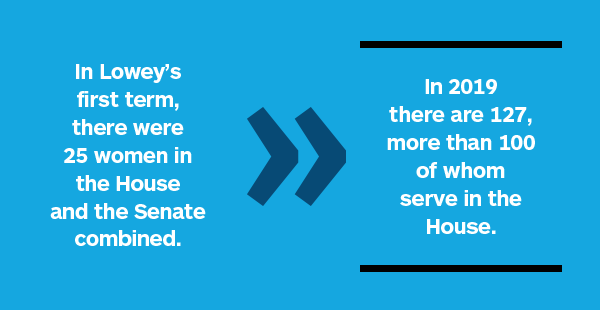 In Lowey’s first term, there were 25 women in the House and Senate combined; in 2019, there are 127, more than 100 of whom serve in the House.
In Lowey’s first term, there were 25 women in the House and Senate combined; in 2019, there are 127, more than 100 of whom serve in the House.
“This was such an extraordinary election,” Lowey said. “There were women who were elected who were my age and there were experienced professionals, women who’d accomplished so much in the military — even commanded a ship — and mayors, activists and kids. … I’m impressed with everyone who is coming in. I work hard to work with them, to answer questions that arise. There are many people coming to me for advice, because … they want my support and for me to advocate for their issues.”
Lowey welcomes this role. “They are quite a group,” she says. “They are so dynamic and smart.” No one, she thinks, should underestimate how tough these women are.
On February 5 Lowey attended the State of the Union address dressed in white, joining more than 100 other women — of all ages and wearing suits, dresses, cape and hijab. Florida Congresswoman Lois Frankel, chairwoman of the Democratic Women’s Working Group, organized the event as a nod to the voters who elected Democrats to the majority in the House. Lowey’s place was prominent — in the front row. She beamed for the cameras.
Lowey believes, as she did when she began in Congress, that she has “the best job.” She has no interest in slowing down. Recently, she says, she was cleaning out a closet and found a lone argyle sock she thinks she began knitting while she was at Mount Holyoke. She tossed the sock. Knitting doesn’t figure into her future. Serving in Congress does. “I can’t think of any other job I would love as much,” she says.
Sarah Buttenwieser lives in Northampton, Massachusetts. A Hampshire alum, she writes for several publications, including The New York Times and The Washington Post.
This article appeared as “The Best Job” in the spring 2019 issue of the Alumnae Quarterly.
May 10, 2019







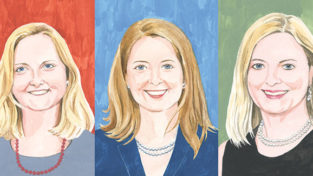


Congratulations on your many accomplishments and successes in making a difference. Fondly recalling our Mount Holyoke experiences.
Excellent article on Nita. We were in the same MHC class-’59- and both were Poli Sci majors. I am so impressed with her. Also, my father-in-law, a dyed in the wool Republican, voted for Nita when she represented his district. The only Democrat he ever voted for.